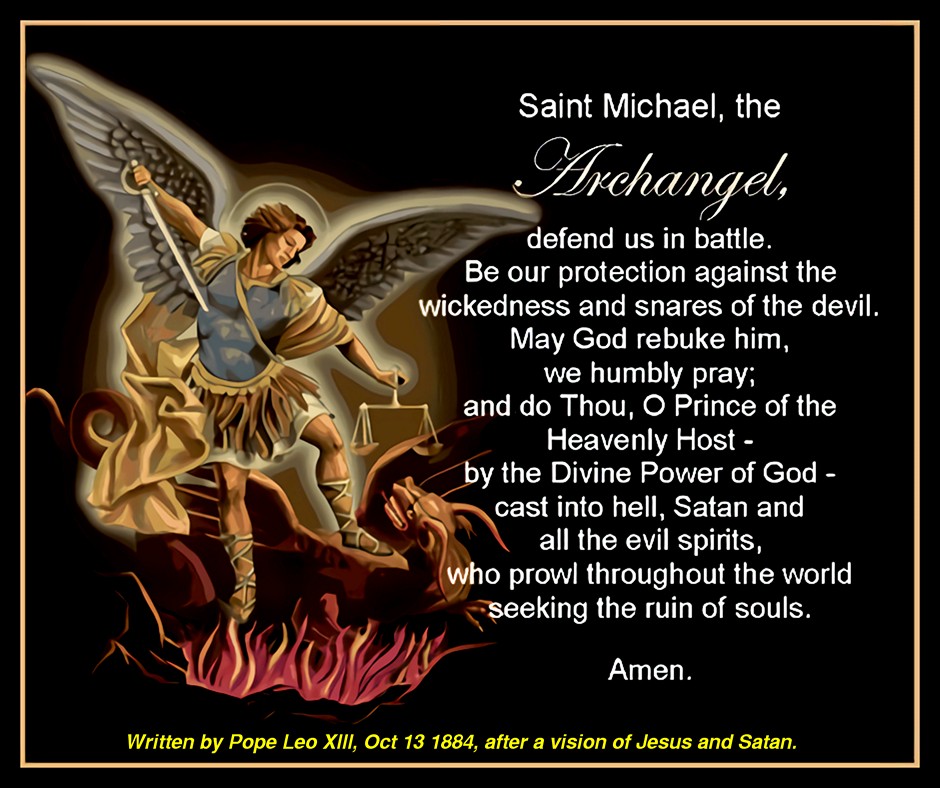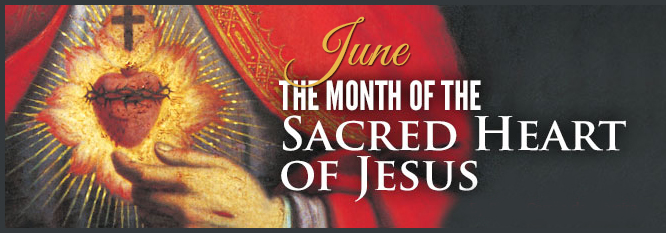
Catena Aurea by St. Thomas Aguinas
5:17–19
17. Think not that I am come to destroy the Law, or the Prophets: I am not come to destroy, but to fulfil.
18. For verily I say unto you, Till heaven and earth pass, one jot or one tittle shall in no wise pass from the law, till all be fulfilled.
19. Whosoever therefore shall break one of these least commandments, and shall teach men so, he shall be called the least in the kingdom of heaven: but whosoever shall do and teach them, the same shall be called great in the kingdom of heaven.
GLOSS. (ord.) Having now exhorted His hearers to undergo all things for righteousness’ sake, and also not to hide what they should receive, but to learn more for others’ sake, that they may teach others, He now goes on to tell them what they should teach, as though He had been asked, ‘What is this which you would not have hid, and for which you would have all things endured? Are you about to speak any thing beyond what is written in the Law and the Prophets;’ hence it is He says, Think not that I am come to subvert the Law or the Prophets.
PSEUDO-CHRYSOSTOM. And that for two reasons. First, that by these words He might admonish His disciples, that as He fulfilled the Law, so they should strive to fulfil it. Secondly, because the Jews would falsely accuse them as subverting the Law, therefore he answers the calumny beforehand, but in such a manner as that He should not be thought to come simply to preach the Law as the Prophets had done.
REMIGIUS. He here asserts two things; He denies that He was come to subvert the Law, and affirms that He was come to fulfil it.
AUGUSTINE. (Serm. in Mont. i. 8.) In this last sentence again there is a double sense; to fulfil the Law, either by adding something which it had not, or by doing what it commands.
CHRYSOSTOM. (Hom. xvi.) Christ then fulfilled the Prophets by accomplishing what was therein foretold concerning Himself—and the Law, first, by transgressing none of its precepts; secondly, by justifying by faith, which the Law could not do by the letter.
AUGUSTINE. (cont. Faust. xix. 7. et seq.) And lastly, because even for them who were under grace, it was hard in this mortal life to fulfil that of the Law, Thou shalt not lust, He being made a Priest by the sacrifice of His flesh, obtained for us this indulgence, even in this fulfilling the Law, that where through our infirmity we could not, we should be strengthened through His perfection, of whom as our head we all are members. For so I think must be taken these words, to fulfil the Law, by adding to it, that is, such things as either contribute to the explanation of the old glosses, or to enable to keep them. For the Lord has shewed us that even a wicked motion of the thoughts to the wrong of a brother is to be accounted a kind of murder. The Lord also teaches us, that it is better to keep near to the truth without swearing, than with a true oath to come near to blasphemy.
AUGUSTINE. But how, ye Manichæans, do you not receive the Law and the Prophets, seeing Christ here says, that He is come not to subvert but to fulfil them? To this the heretic Faustusa replies, Whose testimony is there that Christ spoke this? That of Matthew. How was it then that John does not give this saying, who was with Him in the mount, but only Matthew, who did not follow Jesus till after He had come down from the mount? To this Augustine replies, If none can speak truth concerning Christ, but who saw and heard Him, there is no one at this day who speaks truth concerning Him. Why then could not Matthew hear from John’s mouth the truth as Christ had spoken, as well as we who are born so long after can speak the truth out of John’s book? In the same manner also it is, that not Matthew’s Gospel, but also these of Luke and Mark are received by us, and on no inferior authority. Add, that the Lord Himself might have told Matthew the things He had done before He called him. But speak out and say that you do not believe the Gospel, for they who believe nothing in the Gospel but what they wish to believe, believe themselves rather than the Gospel. To this Faustus rejoins, We will prove that this was not written by Matthew, but by some other hand, unknown, in his name. For below he says, Jesus saw a man sitting at the toll-office, Matthew by name. (Mat. 9:9.) Who writing of himself says, ‘saw a man,’ and not rather ‘saw me?’ Augustine; Matthew does no more than John does, when he says, Peter turning round saw that other disciple whom Jesus loved; and it is well known that this is the common manner of Scripture writers, when writing their own actions. Faustus again, But what say you to this, that the very assurance that He was not come to destroy the Law and the Prophets, was the direct way to rouse their suspicions that He was? For He had yet done nothing that could lead the Jews to think that this was His object. Augustine; This is a very weak objection, for we do not deny that to the Jews who had no understanding, Christ might have appeared as threatening the destruction of the Law and the Prophets. Faustus; But what if the Law and the Prophets do not accept this fulfilment, according to that in Deuteronomy, These commandments that I give unto thee, thou shalt keep, thou shalt not add any thing to them, nor take away. Augustine; Here Faustus does not understand what it is to fulfil the Law, when he supposes that it must be taken of adding words to it. The fulfilment of the Law is love, which the Lord hath given in sending His Holy Spirit. The Law is fulfilled either when the things there commanded are done, or when the things there prophesied come to pass. Faustus; But in that we confess that Jesus was author of a New Testament, what else is it than to confess that He has done away with the Old? Augustine; In the Old Testament were figures of things to come, which, when the things themselves were brought in by Christ, ought to have been taken away, that in that very taking away the Law and the Prophets might be fulfilled wherein it was written that God gave a New Testament. Faustus; Therefore if Christ did say this thing, He either said it with some other meaning, or He spoke falsely, (which God forbid,) or we must take the other alternative, He did not speak it at all. But that Jesus spoke falsely none will aver, therefore He either spoke it with another meaning, or He spake it not at all. For myself I am rescued from the necessity of this alternative by the Manichæan belief, which from the first taught me not to believe all those things which are read in Jesus’ name as having been spoken by Him; for that there be many tares which to corrupt the good seed some nightly sower has scattered up and down through nearly the whole of Scripture. Augustine; Manichæus taught an impious error, that you should receive only so much of the Gospel as does not conflict with your heresy, and not receive whatever does conflict with it. We have learned of the Apostle that religious caution, Whoever preaches unto you another Gospel than that we have preached, let him be accursed. (Gal. 1:8.) The Lord also has explained what the tares signify, not things false mixed with the true Scriptures, as you interpret, but men who are children of the wicked one. Faustus; Should a Jew then enquire of you why you do not keep the precepts of the Law and the Prophets which Christ here declares He came not to destroy but to fulfil, you will be driven either to accept an empty superstition, or to repudiate this chapter as false, or to deny that you are Christ’s disciple. Augustine; The Catholics are not in any difficulty on account of this chapter as though they did not observe the Law and the Prophets; for they do cherish love to God and their neighbour, on which hang all the Law and the Prophets. And whatever in the Law and the Prophets was foreshown, whether in things done, in the celebration of sacramental rites, or in forms of speech, all these they know to be fulfilled in Christ and the Church. Wherefore we neither submit to a false superstition, nor reject the chapter, nor deny ourselves to be Christ’s disciples. He then who says, that unless Christ had destroyed the Law and the Prophets, the Mosaic rites would have continued along with the Christian ordinances, may further affirm, that unless Christ had destroyed the Law and the Prophets, He would yet be only promised as to be born, to suffer, to rise again. But inasmuch as He did not destroy, but rather fulfil them, His birth, passion, and resurrection, are now no more promised as things future, which were signified by the Sacraments of the Law; but He is preached as already born, crucified, and risen, which are signified by the Sacraments now celebrated by Christians. It is clear then how great is the error of those who suppose, that when the signs or sacraments are changed, the things themselves are different, whereas the same things which the Prophetic ordinance had held forth as promises, the Evangelic ordinance points to as completed. Faustus; Supposing these to be Christ’s genuine words, we should enquire what was His motive for speaking thus, whether to soften the blind hostility of the Jews, who when they saw their holy things trodden under foot by Him, would not have so much as given Him a hearing; or whether He really said them to instruct us, who of the Gentiles should believe, to submit to the yoke of the Law. If this last were not His design, then the first must have been; nor was there any deceit or fraud in such purpose. For of laws there be three sorts. The first that of the Hebrews, called the law of sin and death, (Rom. 8:2.) by Paul; the second that of the Gentiles, which he calls the law of nature, saying, By nature the Gentiles do the deeds of the law; (Rom. 2:14.) the third, the law of truth, which he names, The law of the Spirit of life. Also there are Prophets some of the Jews, such as are well known; others of the Gentiles as Paul speaks, A prophet of their own hath said; (Tit. 1:12.) and others of the truth, of whom Jesus speaks, I send unto you wise men and prophets. (Mat. 23:34.) Now had Jesus in the following part of this Sermon brought forward any of the Hebrew observances to shew how he had fulfilled them, no one would have doubted that it was of the Jewish Law and Prophets that He was now speaking; but when He brings forward in this way only those more ancient precepts, Thou shalt not kill, Thou shalt not commit adultery, which were promulged of old to Enoch, Seth, and the other righteous men, who does not see that He is here speaking of the Law and Prophets of truth? Wherever He has occasion to speak of any thing merely Jewish, He plucks it up by the very roots, giving precepts directly the contrary; for example, in the case of that precept, An eye for an eye, a tooth for a tooth. Augustine; Which was the Law and which the Prophets, that Christ came not to subvert but to fulfil, is manifest, to wit, the Law given by Moses. And the distinction which Faustus draws between the precepts of the righteous men before Moses, and the Mosaic Law, affirming that Christ fulfilled the one but annulled the other, is not so. We affirm that the Law of Moses was both well suited to its temporary purpose, and was now not subverted, but fulfilled by Christ, as will be seen in each particular. This was not understood by those who continued in such obstinate error, that they compelled the Gentiles to Judaize—those heretics, I mean, who were called Nazarenes.
PSEUDO-CHRYSOSTOM. But since all things which should befal from the very beginning of the world to the end of it, were in type and figure foreshewn in the Law, that God may not be thought to be ignorant of any of those things that take place, He therefore here declares, that heaven and earth should not pass till all things thus foreshewn in the Law should have their actual accomplishment.
REMIGIUS. Amen is a Hebrew word, and may be rendered in Latin, ‘vere,’ ‘fidenter,’ or ‘fiat;’ that is, ‘truly,’ ‘faithfully,’ or ‘so be it.’ The Lord uses it either because of the hardness of heart of those who were slow to believe, or to attract more particularly the attention of those that did believe.
HILARY. From the expression here used pass, we may suppose that the constituting elements of heaven and earth shall not be annihilatedb.
REMIGIUS. But shall abide in their essence, but pass through renewal.
AUGUSTINE. (Serm. in Mont. i. 8.) By the words, one iota or one point shall not pass from the Law, we must understand only a strong metaphor of completeness, drawn from the letters of writing, iota being the least of the letters, made with one stroke of the pen, and a point being a slight dot at the end of the same letter. The words there shew that the Law shall be completed to the very least matter.
RABANUS. He fitly mentions the Greek iota, and not the Hebrew jod, because the iota stands in Greek for the number ten, and so there is an allusion to the Decalogue of which the Gospel is the point and perfection.
PSEUDO-CHRYSOSTOM. If even an honourable man blushes to be found in a falsehood, and a wise man lets not fall empty any word he has once spoken, how could it be that the words of heaven should fall to the ground empty? Hence He concludes, Whoso shall break the least of these commandments, &c. And, I suppose, the Lord goes on to reply Himself to the question, Which are the least commandments? Namely, these which I am now about to speak.
CHRYSOSTOM. He speaks not this of the old laws, but of those which He was now going to enact, of which he says, the least, though they were all great. For as He so oft spoke humbly of Himself, so does He now speak humbly of His precepts.
PSEUDO-CHRYSOSTOM. Otherwise; the precepts of Moses are easy to obey; Thou shall not kill. Thou shall not commit adultery. The very greatness of the crime is a check upon the desire of committing it; therefore the reward of observance is small, the sin of transgression great. But Christ’s precepts, Thou shalt not be angry, Thou shalt not lust, are hard to obey, and therefore in their reward they are great, in their transgression, ‘least.’ It is thus He speaks of these precepts of Christ, such as Thou shall not be angry, Thou shalt not lust, as ‘the least;’ and they who commit these lesser sins, are the least in the kingdom of God; that is, he who has been angry and not sinned grievously is secure from the punishment of eternal damnation; yet he does not attain that glory which they attain who fulfil even these least.
AUGUSTINE. (ubi sup.) Or, the precepts of the Law are called ‘the least,’ as opposed to Christ’s precepts which are great. The least commandments are signified by the iota and the point. He, therefore, who breaks them, and teaches men so, that is, to do as he does, shall be called least in the kingdom of heaven. Hence we may perhaps conclude, that it is not true that there shall none be there except they be great.
GLOSS. (ord.) By ‘break,’ is meant, the not doing what one understands rightly, or the not understanding what one has corrupted, or the destroying the perfectness of Christ’s additions.
CHRYSOSTOM. Or, when you hear the words, least in the kingdom of heaven, imagine nothing less than the punishment of hell. For He oft uses the word ‘kingdom,’ not only of the joys of heaven, but of the time of the resurrection, and of the terrible coming of Christ.
GREGORY. (Hom. in Ev. xii. 1.) Or, by the kingdom of heaven is to be understood the Church, in which that teacher who breaks a commandment is called least, because he whose life is despised, it remains that his preaching be also despised.
HILARY. Or, He calls the passion, and the cross, the least, which if one shall not confess openly, but be ashamed of them, he shall be least, that is, last, and as it were no man; but to him that confesses it He promises the great glory of a heavenly calling.
JEROME. This head is closely connected with the preceding. It is directed against the Pharisees, who, despising the commandments of God, set up traditions of their own, and means that their teaching the people would not avail themselves, if they destroyed the very least commandment in the Law. We may take it in another sense. The learning of the master if joined with sin however small, loses him the highest place, nor does it avail any to teach righteousness, if he destroys it in his life. Perfect bliss is for him who fulfils in deed what he teaches in word.
AUGUSTINE. (ubi sup.) Otherwise; he who breaks the least of these commandments, that is, of Moses’ Law, and teaches men so, shall be called the least; but he who shall do (these least), and so teach, shall not indeed be esteemed great, yet not so little as he who breaks them. That he should be great, he ought to do and to teach the things which Christ now teaches.
Catena Aurea Matthew 5
Saint John of Sahagún
June 12
John (1430?-1479) was a peacemaker and worker for justice in society. He defended the rights of workers. A sincere and humble man, he was a noted preacher, whose devotion to the Eucharist marked all aspects of his life.
Born in Sahagun, Leon, Spain around the year 1430, John was raised in a prominent family. While he was still young, John's father obtained for him a position which would guarantee him a substantial income.
John refused to accept this position, because he saw it as contrary to God's way. His family was very disappointed.
Seeing the good qualities of his life, Alphonsus of Carthage, the Bishop of Burgos, ordained John a priest and gave him a position of responsibility in the administration of the Church.
John did not find this work fulfilling, however. So he went to live in Salamanca, where he engaged in study and preaching. While John was ministering at the Church of Saint Bartholomew, the Duke of Alba complained when he used the pulpit to denounce not only the sins of common people, but also the sins of the nobility.
“Father, you do not know how to control your tongue,” the Duke angrily charged.
John responded, “Sir Duke, tell me why did I walk into that Pulpit: To proclaim the truth to all who would listen, or to shamefully praise you? A preacher must be prepared in his soul to speak the truth, both in denouncing and correcting shortcomings and in praising virtue, to such a point that he is willing in that cause even to face death.”
Still not satisfied with his life as a diocesan Priest, he joined the Augustinians in 1463. The Friars recognized his abilities, and chose him twice to serve as Prior (local superior) of the Salamanca Monastery. He was a delegate to every Province Chapter held during his years in the Order.
The people saw him as wise and prudent. He was able to reconcile feuding families. He championed the rights of workers. He was a man of prayer, and was particularly devoted to the Eucharist.
One of his contemporaries gave this testimony to John's character: “If you ask me about the actions of Friar John, with regard to the poor and afflicted, exploited widows and children, the needy and the sick, I would have to say that he was naturally compelled to help them all in word and in deed. He was particularly interested in leading all to peace and harmony, and putting an end to hostility. Living in Salamanca, where the entire city was split into factions, he succeeded in preventing much bloodshed.”
Due to John's repeated initiatives for peace, the opposing nobles of Salamanca signed in 1476 a solemn and perpetual peace treaty.
John drew his courage and strength especially from the daily celebration of the Eucharist, to which he was highly devoted.
John died in Salamanca June 11, 1479. His biographer, Friar John of Seville, believed that he was poisoned by somebody who did not like the honesty of his preaching. He was beatified in 1601 and canonized in 1690. His remains are preserved at the Cathedral of Salamanca.
midwestaugustinians.org
NAVARRE BIBLE COMMENTARY (RSV)
Ad Majorem Dei Gloriam (To the Greater Glory of God)
First Reading:
From: 1 Kings 18:20-39
The sacrifice on Mount Carmel
---------------------------------------
[20] So Ahab sent to all the people of Israel, and gathered the prophets together at Mount Carmel. [21] And Elijah came near to all the people, and said, "How long will you go limping with two different opinions? If the LORD is God, follow him; but if Baal, then follow him." And the people did not answer him a word. [22] Then Elijah said to the people, "I, even I only, am left a prophet of the LORD; but Baal's prophets are four hundred and fifty men. [23] Let two bulls be given to us; and let them choose one bull for themselves, and cut it in pieces and lay it on the wood, but put no fire to it; and I will prepare the other bull and lay it on the wood, and put no fire to it. [24] And you call on the name of your god and I will call on the name of the LORD; and the God who answers by fire, he is God." And all the people answered, "It is well spoken." [25] Then Elijah said to the prophets of Baal, "Choose for yourselves one bull and prepare it first, for you are many; and call on the name of your god, but put no fire to it." [26] And they took the bull which was given them, and they prepared it, and called on the name of Baal from morning until noon, saying, "O Baal, answer us!" But there was no voice, and no one answered. And they limped about the altar which they had made. [27] And at noon Elijah mocked them, saying, "Cry aloud, for he is a god; either he is musing, or he has gone aside, or he is on a journey, or perhaps he is asleep and must be awakened." [28] And they cried aloud, and cut themselves after their custom with swords and lances, until the blood gushed out upon them. [29] And as midday passed, they raved on until the time of the offering of the oblation, but there was no voice; no one answered, no one heeded.
[30] Then Elijah said to all the people, "Come near to me"; and all the people came near to him. And he repaired the altar of the LORD that had been thrown down; [31] Elijah took twelve stones, according to the number of the tribes of the sons of Jacob, to whom the word of the LORD came, saying, "Israel shall be your name"; [32] and with the stones he built an altar in the name of the LORD. And he made a trench about the altar, as great as would contain two measures of seed. [33] And he put the wood in order, and cut the bull in pieces and laid it on the wood. And he said, "Fill four jars with water, and pour it on the burnt offering, and on the wood." [34] And he said, "Do it a second time"; and they did it a second time. And he said, "Do it a third time"; and they did it a third time. [35] And the water ran round about the altar, and filled the trench also with water.
[36] And at the time of the offering of the oblation, Elijah the prophet came near and said, "O LORD, God of Abraham, Isaac, and Israel, let it be known this day that thou art God in Israel, and that I am thy servant, and that I have done all these things at thy word. [37] Answer me, O LORD, answer me, that this people may know that thou, O LORD, art God, and that thou hast turned their hearts back." [38] Then the fire of the LORD fell, and consumed the burnt offering, and the wood, and the stones, and the dust, and licked up the water that was in the trench. [39] And when all the people saw it, they fell on their faces; and they said, "The LORD, he is God; the LORD, he is God."
**************************************************************
Commentary:
18:20-40. "Carmel" is a chain of mountains that starts near the port of Haifa and runs some 30 km. (18.5 miles) south-east. Its height (almost 600 m. or 1800 ft.) and its lush vegetation made it particularly suitable as a place of religious cult (at that time, the local people worshipped Baal). There, the one, true God will make himself manifest in the sacrificial fire. To begin with, the people have nothing to say when Elijah upbraids them, but at the end of the episode (v. 38) they make a profession of faith which echoes in a way the faith of the prophet, who bears witness to the living God. The name of Elijah, "The Lord is my God', foretells the people's cry in response to his prayer on Mount Carmel" ("Catechism of the Catholic Church", 2582).
The fire which consumes the offering is a figure of the Holy Spirit: "While water signifies birth and the fruitfulness of life given in the Holy Spirit, fire symbolizes the transforming energy of the Holy Spirit's actions. The prayer of the prophet Elijah, who 'arose like fire' and whose 'word burned like a torch' (Sir 48:1), brought down fire from heaven on the sacrifice on Mount Carmel (cf. 1 Kings 18:38-39). This event was a 'figure' of the fire of the Holy Spirit, who transforms what he touches. John the Baptist, who goes 'before [the Lord] in the spirit and power of Elijah' (Lk 1:17), proclaims Christ as the one who 'who will baptize you with Holy Spirit and with fire' (Lk 3:16). Jesus will say of the Spirit: 'I came to cast fire upon the earth; and would that it were already kindled!' (Lk 12:49). In the form of tongues 'as of fire', the Holy Spirit rests on the disciples on the morning of Pentecost and fills them with himself (Acts 2:3-4). The spiritual tradition has retained this symbolism of fire as one of the most expressive images of the Holy Spirit's actions (cf. St John of the Cross, "The Living Flame of Love"). 'Do not quench the Spirit' (1 Thess 5:19)" ("Catechism of the Catholic Church", 696).
The similarity between the fire of Elijah's offering and the action of the Holy Spirit in the eucharistic sacrifice was noted by the Fathers. But the typology can be extended further: "The sacrifice on Mount Carmel is a decisive test for the faith of the People of God. The Lord's fire consumes the holocaust, at the time of the evening oblation. The Eastern liturgies repeat Elijah's plea in the Eucharistic epiclesis" ("Catechism of the Catholic Church", 2583).
Elijah's action at the end -- killing the false prophets -- needs to be understood in the light of his zeal for the Lord and of the mentality of the time, for the Mosaic Law prescribed exactly such treatment for prophets of pagan divinities in order to safeguard the religious purity of the people (cf. Deut 13:13-19).











